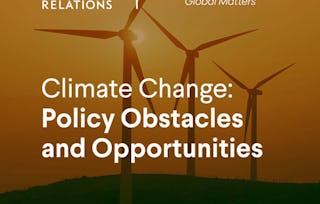This course explores and critically analyzes historical and contemporary climate policies (e.g. Kyoto Protocol and the Paris Agreement). Political issues pertaining to energy sources, such as nuclear energy, will be reviewed. The course will focus on understanding key climate principles and terms surrounding policy development, specifically for low-income or developing countries/communities. Further, this course explores up-to-date technologies that are used in climate analysis.

Global Climate Change Policies and Analysis
Ends soon: Gain next-level skills with Coursera Plus for $199 (regularly $399). Save now.

Global Climate Change Policies and Analysis
This course is part of Modeling and Predicting Climate Anomalies Specialization

Instructor: Osita Onyejekwe
Included with
Recommended experience
What you'll learn
Identify climate goals and policies, such as the Kyoto Protocol and the Paris Agreement.
Describe the impacts of climate change.
Evaluate the technological, economic, and policy challenges associated climate change mitigation strategies.
Skills you'll gain
Details to know

Add to your LinkedIn profile
2 assignments
See how employees at top companies are mastering in-demand skills

Build your subject-matter expertise
- Learn new concepts from industry experts
- Gain a foundational understanding of a subject or tool
- Develop job-relevant skills with hands-on projects
- Earn a shareable career certificate

There are 4 modules in this course
In this module, you will delve into critical aspects of energy and environmental governance, starting with an exploration of global climate policies and their effectiveness. The focus then shifts to understanding the historical development and contemporary debates surrounding nuclear energy as an alternative to fossil fuels, examining its potential roles and challenges. The module concludes with an exploration of future energy landscapes, emphasizing renewable energy sources and their policy incentives in the United States.
What's included
3 videos8 readings1 assignment2 peer reviews2 discussion prompts
In this module, you will embark on an in-depth exploration of nuclear power, beginning with a foundational understanding of what nuclear power entails. Then, you will explore various perspectives of nuclear power as an alternative energy source before examining nuclear energy policies and technological advancements tailored for the 21st century, analyzing how regulations and innovations shape the nuclear energy landscape globally.
What's included
4 readings1 assignment1 peer review
This module centers on an exploration of climate change and its multifaceted impacts. You will begin by examining the fundamentals of climate change before delving into the intricate relationship between weather patterns and climate change, analyzing how global warming influences regional climates and exacerbates extreme weather events. The discussion then shifts to the phenomena of El Niño and La Niña, exploring their roles in altering weather patterns globally and their implications for climate variability. You will also investigate the alarming trend of mountain glacier recession, studying the environmental, social, and hydrological ramifications of diminishing glaciers worldwide.
What's included
8 readings1 peer review2 discussion prompts
In this final module, you will explore future emission scenarios and mitigation strategies crucial for addressing climate change. First, you will examine emission scenarios, discussing how different projections influence climate models and policy decisions, and Representative Concentration Pathways (RCPs), analyzing these pathways as frameworks for quantifying greenhouse gas concentrations and their impacts on global climate. Then you will explore carbon capture and storage (CCS) technologies, focusing on their role in mitigating emissions by capturing CO2 from industrial processes and storing it underground.
What's included
4 readings2 peer reviews
Earn a career certificate
Add this credential to your LinkedIn profile, resume, or CV. Share it on social media and in your performance review.
Build toward a degree
This course is part of the following degree program(s) offered by University of Colorado Boulder. If you are admitted and enroll, your completed coursework may count toward your degree learning and your progress can transfer with you.¹
Instructor

Offered by
Explore more from Environmental Science and Sustainability
 Status: Free Trial
Status: Free TrialUniversity of Colorado Boulder
 Status: Preview
Status: PreviewUniversity of London
 Status: Free Trial
Status: Free TrialCouncil on Foreign Relations
 Status: Free Trial
Status: Free TrialUniversity of Colorado Boulder
Why people choose Coursera for their career





Open new doors with Coursera Plus
Unlimited access to 10,000+ world-class courses, hands-on projects, and job-ready certificate programs - all included in your subscription
Advance your career with an online degree
Earn a degree from world-class universities - 100% online
Join over 3,400 global companies that choose Coursera for Business
Upskill your employees to excel in the digital economy
Frequently asked questions
To access the course materials, assignments and to earn a Certificate, you will need to purchase the Certificate experience when you enroll in a course. You can try a Free Trial instead, or apply for Financial Aid. The course may offer 'Full Course, No Certificate' instead. This option lets you see all course materials, submit required assessments, and get a final grade. This also means that you will not be able to purchase a Certificate experience.
When you enroll in the course, you get access to all of the courses in the Specialization, and you earn a certificate when you complete the work. Your electronic Certificate will be added to your Accomplishments page - from there, you can print your Certificate or add it to your LinkedIn profile.
Yes. In select learning programs, you can apply for financial aid or a scholarship if you can’t afford the enrollment fee. If fin aid or scholarship is available for your learning program selection, you’ll find a link to apply on the description page.
More questions
Financial aid available,

